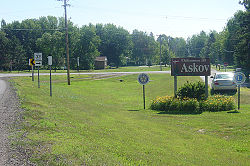Askov
| Askov, Minnesota | |
|---|---|
| City | |

Askov, Minnesota; July 2007
|
|
 Location of the city of Askov within Pine County, Minnesota |
|
| Coordinates: 46°11′16″N 92°46′51″W / 46.18778°N 92.78083°W | |
| Country | United States |
| State | Minnesota |
| County | Pine |
| Area | |
| • Total | 1.26 sq mi (3.26 km2) |
| • Land | 1.26 sq mi (3.26 km2) |
| • Water | 0 sq mi (0 km2) |
| Elevation | 1,168 ft (356 m) |
| Population (2010) | |
| • Total | 364 |
| • Estimate (2016) | 347 |
| • Density | 290/sq mi (110/km2) |
| • Demonym | Askovian |
| Time zone | Central (CST) (UTC-6) |
| • Summer (DST) | CDT (UTC-5) |
| ZIP code | 55704 |
| Area code(s) | 320 |
| FIPS code | 27-02548 |
| GNIS feature ID | 0639478 |
Askov is a city in Pine County, Minnesota, United States. The population was 364 at the 2010 census.
Minnesota State Highway 23 serves as a main route in the community, and Interstate 35 is nearby.
Originally the Village of Partridge, it was a Great Northern Railway stop; its post office began as Partridge, 1889–1909, before changing to Askov. Most of the village was destroyed in the 1894 Hinckley fire. In the re-building, the new village was founded by the Danish Peoples Society in 1906. The name "Askov" means "ash forest" and is the name of Denmark's largest folk high school. The new village was incorporated on April 25, 1918, and officially separated from the township as the City of Askov on April 8, 1921. Consequently, nearly all the streets in Askov have Danish names.
According to the United States Census Bureau, the city has a total area of 1.26 square miles (3.26 km2), all land.
The Kettle River and Partridge Creek both flow nearby. Banning State Park is also nearby.
As of the census of 2010, there were 364 people, 171 households, and 88 families residing in the city. The population density was 288.9 inhabitants per square mile (111.5/km2). There were 188 housing units at an average density of 149.2 per square mile (57.6/km2). The racial makeup of the city was 97.3% White, 0.3% Native American, 0.3% Asian, and 2.2% from two or more races. Hispanic or Latino of any race were 1.4% of the population.
...
Wikipedia
